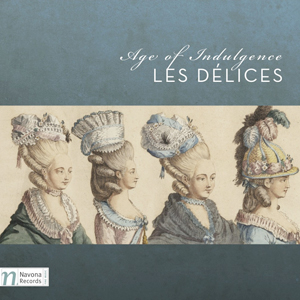by Daniel Hathaway

It’s a winning combination. Trimmed slightly to fit onto a compact disc, Les Délices’ program of late Baroque music by Philador, Blavet, Rameau, Guignon, and Duphly works as well here as it did in the live performance reviewed on ClevelandClassical.com by Nicholas Jones.
The performers include founder, artistic director, and oboist Debra Nagy, violinists Julie Andrijeski and Karina Schmitz, gambist Emily Walhout, and harpsichordist Michael Sponseller. Nagy takes the spotlight in Michael Blavet’s Sonata Seconda, originally for flute but here adapted for the oboe with no loss of expressive nuance. Andrijeski and Schmitz star in Jean-Pierre Guignon’s wildly energetic version of Rameau’s Les sauvages for violins alone, and Sponseller has Jacques Duphly’s striking Rondeau and Le Félix all to himself. While Walhout’s is more of an ensemble role, she and Sponseller are super-attentive to the all-important continuo lines, which now and again have their own moments to sparkle.
The whole ensemble appears at the beginning (in François-André Philador’s Sinfonia V), in midstream (excerpts from Jean-Philippe Rameau’s operas Les Boréades, Les Fêtes de l’Hymen, and Dardanus), and at the end (Philador’s Sinfonia I), playing with elegance, easy virtuosity, and the sense of flexibility of rhythm that makes performing French music of the period so difficult.
As usual, Rameau steals the show with music of affecting eloquence, but there are harmonic and rhetorical surprises on nearly every track of the disc. Passages where the treble instruments play in unison — not a simple effect to pull off — are especially impressive.
The disc, released on the Navon label, was produced by Erica Brenner and engineered by Bruce Egre. The sound is lively and immediate. Baroque music fans should definitely indulge themselves in this recording.
Published on ClevelandClassical.com June 7, 2017.
Click here for a printable copy of this article



